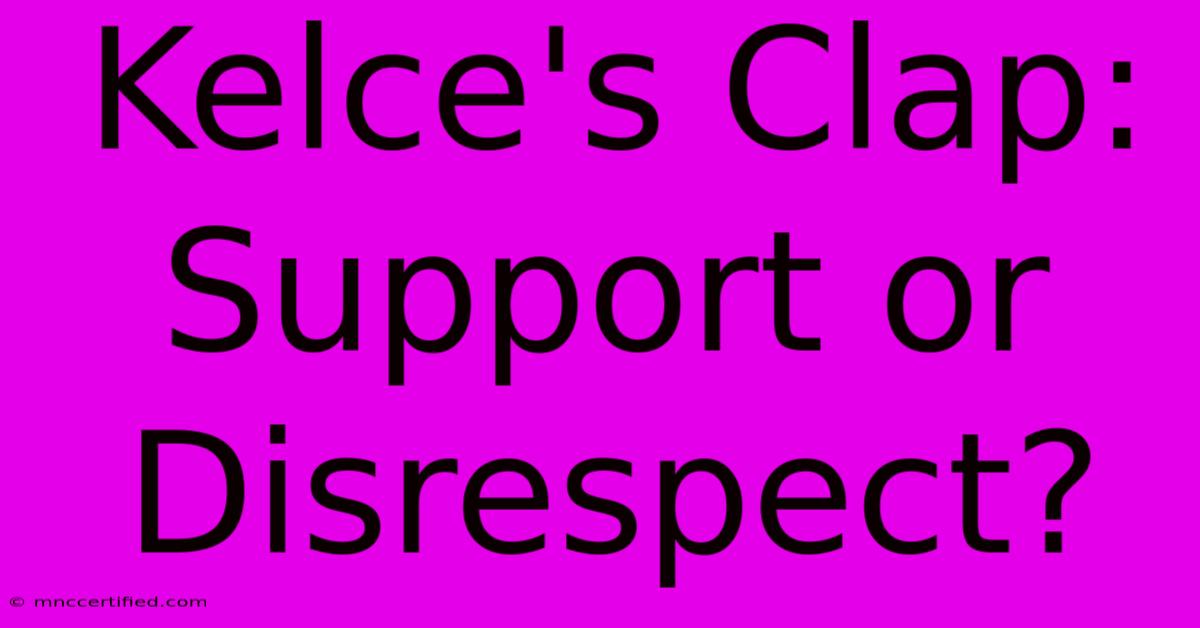Kelce's Clap: Support Or Disrespect?

Table of Contents
Kelce's Clap: Support or Disrespect? The NFL's Newest Controversy
Travis Kelce's exuberant celebrations have always been a hallmark of his game. But his post-game clap at the Super Bowl LVII victory parade sparked a fiery debate: was it a display of joyful support for his team, or a disrespectful slight towards the losing team? Let's delve into the controversy and explore both sides of this highly divisive issue.
The Clap Heard 'Round the World
The scene is etched in the minds of football fans everywhere: a triumphant Travis Kelce, basking in the glow of a Super Bowl victory, clapping rhythmically while seemingly ignoring the presence of the Philadelphia Eagles' opponents. This seemingly simple gesture ignited a whirlwind of opinions across social media and sports news outlets, dividing fans into two fervent camps.
Arguments for Respectful Celebration
Many argue that Kelce's clap was simply an unrestrained expression of joy and celebration following a hard-fought victory. It's easy to forget, in the heat of the moment, about the opposing team. This perspective emphasizes the intense emotions of a Super Bowl win, suggesting that Kelce's actions were purely instinctual and not intended as a deliberate slight. Furthermore, proponents of this view point to Kelce's overall sportsmanship throughout his career as evidence that this one moment doesn't define his character. It was, they claim, simply unbridled enthusiasm.
Arguments for Disrespectful Conduct
On the other hand, a significant portion of fans and commentators believe that Kelce's seemingly oblivious clap was disrespectful to the Kansas City Chiefs' opponents, the Philadelphia Eagles. The argument rests on the idea that the victory celebration should be more inclusive and acknowledge the efforts of the opposing team, highlighting the fact that the Eagles played an incredibly close and competitive game. The visible lack of acknowledgment towards the Eagles is seen as a sign of arrogance and poor sportsmanship, particularly given the highly competitive nature of the game and the Eagles' own impressive season. This viewpoint highlights the importance of grace in victory and emphasizes the value of recognizing the achievement of both teams.
Analyzing the Context: More Than Just a Clap
To fully understand the controversy, it's crucial to analyze the context surrounding the clap. Was it a planned gesture? Was it spontaneous? The lack of clear evidence makes it difficult to definitively determine Kelce's intentions. This ambiguity fuels the debate, leading to passionate arguments from both sides.
Factors to Consider:
- Body Language: Did Kelce's overall body language indicate a deliberate disregard for the other team?
- Post-Game Interviews: Did Kelce address the situation in subsequent interviews? His comments (or lack thereof) can offer further insight into his perspective.
- Past Behavior: Does this incident align with Kelce's typical behavior on and off the field?
The Broader Implications: Sportsmanship and Social Media
The controversy surrounding Kelce's clap extends beyond the individual player. It highlights the broader issues of sportsmanship, social media's role in amplifying controversies, and the intense emotional investment fans have in their teams. The rapid spread of the video and the subsequent online discussions underscore the power of social media to shape public perception and ignite debates. The incident serves as a reminder of the importance of respectful conduct in sports and the need for thoughtful consideration of actions, especially those that are captured and shared on a global scale.
Conclusion: A Lasting Debate
Ultimately, whether Kelce's clap was a show of support or disrespect remains a matter of interpretation. The lack of definitive evidence leaves room for multiple perspectives, fueling the ongoing debate. The incident underscores the complex emotions surrounding professional sports, the power of social media, and the importance of thoughtful consideration of one's actions in the public eye. The "Kelce Clap" will likely continue to be a subject of discussion for years to come, serving as a reminder of the passionate and often polarizing nature of fandom.

Thank you for visiting our website wich cover about Kelce's Clap: Support Or Disrespect?. We hope the information provided has been useful to you. Feel free to contact us if you have any questions or need further assistance. See you next time and dont miss to bookmark.
Featured Posts
-
Renters Insurance West Palm Beach
Nov 19, 2024
-
Dune Sisterhood Prophecy Review Gloom
Nov 19, 2024
-
Jennifer Lawrence Pregnant Baby Bump
Nov 19, 2024
-
Earth Movement Insurance Coverage
Nov 19, 2024
-
Mortgage Rates Starmer Denies Budget Impact
Nov 19, 2024